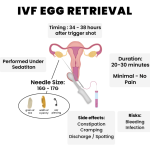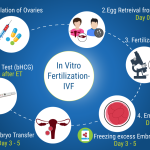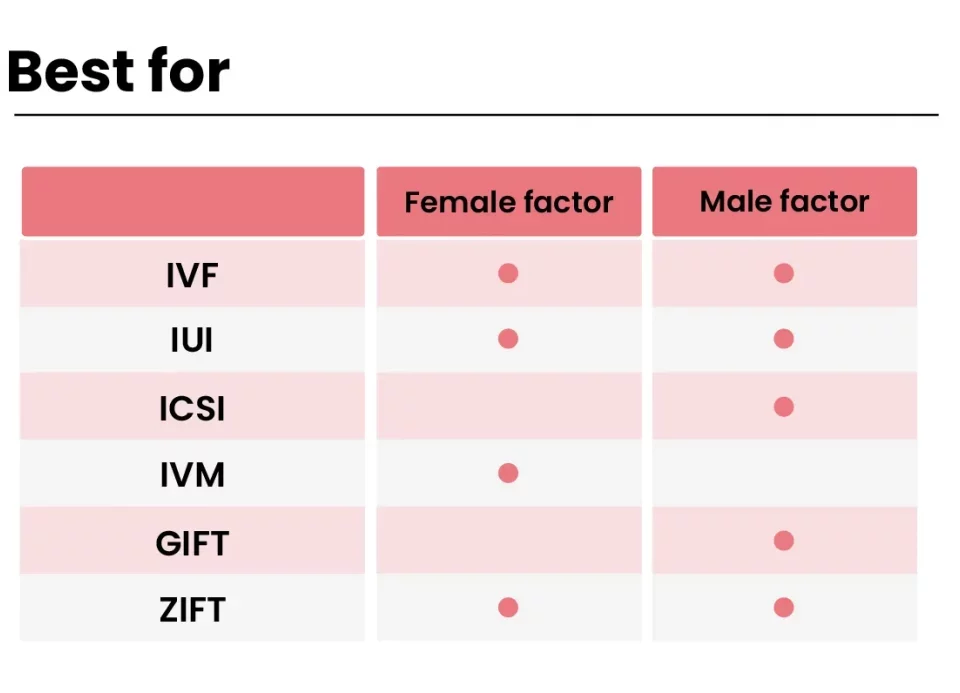
What Does IVF Stand for in Medical Terms?
April 21, 2025
Is IVF Haram? Exploring Islam’s Take on In Vitro Fertilization
April 21, 2025What Are the Long-Term Side Effects of IVF Injections?

What Are the Long-Term Side Effects of IVF Injections?
In vitro fertilization (IVF) has been a game-changer for millions of people dreaming of starting a family. Those daily injections—packed with hormones to kickstart egg production—are a big part of the process. They’re a small price to pay for the chance to hold a baby in your arms, right? But as you’re jabbing that needle into your skin, it’s natural to wonder: What’s this doing to my body years down the road? The short-term stuff—like bloating or mood swings—gets plenty of airtime, but the long-term effects? That’s where the conversation gets fuzzy. Let’s dive in and unpack what we know, what’s still murky, and what you can do to feel more in control of your IVF journey.
The Basics: What’s in Those IVF Shots?
IVF injections aren’t just one-size-fits-all. They’re a cocktail of hormones tailored to nudge your ovaries into overdrive. Typically, you’re looking at:
- Follicle-Stimulating Hormone (FSH): This is the star player, telling your ovaries to produce more eggs than they would in a natural cycle.
- Luteinizing Hormone (LH): Often paired with FSH, it helps those eggs mature and get ready for retrieval.
- Human Chorionic Gonadotropin (hCG): The “trigger shot” that says, “Go time!” for ovulation.
- GnRH Agonists or Antagonists: These keep your body from ovulating too early, giving doctors control over the timing.
Each of these works together to create the perfect storm for egg production. But pumping your body with extra hormones isn’t something it’s used to. So, what happens after the IVF cycle ends and the years roll by?
Short-Term vs. Long-Term: Setting the Stage
You’ve probably heard about the immediate side effects: a little bruising at the injection site, feeling bloated like you ate a whole pizza, or crying at a dog food commercial. Those usually fade once the treatment wraps up. But long-term effects are trickier—they’re about what lingers or pops up later, maybe even decades down the line. Think of it like planting a seed: you might not see the tree for years, but it’s still growing underground. Are IVF injections planting anything we should worry about? Let’s explore the possibilities.
The Big Question: Cancer Risk
One of the scariest worries people have is whether IVF injections could increase the odds of cancer later in life. The hormones in these shots—especially estrogen—play a role in how cells grow, and some cancers (like breast and ovarian) are hormone-sensitive. So, it’s a fair question: Could years of extra hormones tip the scales?
What Studies Say About Ovarian Cancer
Ovarian cancer is rare but serious, and because IVF injections target the ovaries, it’s a hot topic. Early studies raised red flags, suggesting a possible link between fertility drugs and ovarian cancer. But here’s the good news: more recent research has calmed those fears. A massive study from the Netherlands followed over 25,000 women who had IVF between 1983 and 1995. After 21 years, they found no significant increase in ovarian cancer risk compared to women who didn’t use fertility drugs. Another review in 2018, pulling data from dozens of studies, echoed this: no clear connection.
But there’s a twist—borderline ovarian tumors (not full-on cancer, but abnormal growths) showed a slight uptick in some reports. The absolute risk is tiny, though, and experts aren’t sure if it’s the drugs, infertility itself, or just better monitoring catching these early.
Breast Cancer: A Mixed Bag
Breast cancer’s another big one because estrogen can fuel it. A 2016 study in JAMA tracked women who’d had IVF and found no overall increase in breast cancer risk after 20 years. That’s reassuring! But dig deeper, and it’s not all black-and-white. Women who started IVF young (under 30) or had multiple cycles sometimes showed a small bump in risk. Why? It might be the extra estrogen exposure over time—or it could be tied to why they needed IVF in the first place, like hormone imbalances.
Endometrial Cancer and Beyond
The uterus gets a workout during IVF too, thanks to progesterone and estrogen prepping it for embryos. A few studies hint at a slightly higher risk of endometrial cancer, especially if you’ve had lots of cycles. But again, the numbers are small, and infertility itself is a known risk factor, muddying the waters.
The Takeaway on Cancer
Here’s the bottom line: most evidence says IVF injections don’t dramatically raise your cancer risk. If there’s any increase, it’s subtle and tangled up with other factors—like age, genetics, or infertility issues. Still, it’s smart to keep up with regular checkups. Cancer’s a heavy word, but the data leans toward peace of mind.
✔️ Tip: Ask your doctor about your personal risk factors—family history matters more than IVF ever will.
❌ Don’t: Panic over every headline. Context is everything.
Heart Health: An Unexpected Angle
Cancer gets the spotlight, but what about your ticker? IVF floods your system with hormones, and estrogen can mess with blood vessels and clotting. Could that set you up for heart trouble later?
Blood Pressure and Beyond
A 2017 study in the Canadian Medical Association Journal peeked at this. They followed women post-IVF and noticed a slightly higher chance of high blood pressure during pregnancy (preeclampsia), which can signal heart risks later. But long-term? The jury’s still out. Some researchers think the hormone surges might stress blood vessels in ways we don’t fully see yet—kind of like how a car engine revs hard and needs a tune-up later.
A Fresh Perspective: Epigenetics
Here’s something you won’t find in every article: IVF might tweak how your genes behave, a field called epigenetics. Animal studies show hormone overload can subtly change how blood pressure or cholesterol genes work. In humans, we’re not there yet, but it’s a clue worth watching. Imagine your body’s instruction manual getting a few scribbled notes—nothing major, but enough to wonder about down the road.
✔️ Tip: Keep an eye on your blood pressure and cholesterol post-IVF. Simple lifestyle tweaks—like walking or cutting salt—can go a long way.
❌ Don’t: Assume every twinge is a heart attack. Data’s too thin for that.
Mental Health: The Silent Side Effect
IVF’s a rollercoaster—hope, stress, joy, disappointment, all in one ride. Everyone talks about the emotional toll during treatment, but what about years later?
Lingering Stress or Resilience?
There’s no solid proof IVF injections directly cause long-term mental health issues like depression or anxiety. The hormones might leave you frazzled short-term, but studies—like one from 2020 in Fertility and Sterility—suggest most people bounce back after treatment ends. In fact, successfully having a kid can boost your mental well-being big-time. But if IVF didn’t work, or you faced losses along the way, that unresolved grief might linger.
A New Angle: The Parenthood Shift
Here’s a thought you might not see elsewhere: IVF can change how you feel about your body long-term. Some women say they feel stronger, like they’ve conquered a mountain. Others feel a quiet unease, wondering if those shots left invisible marks. It’s not clinical depression, but a shift in self-image that’s hard to measure.
Quick Quiz: How do you feel about your IVF journey today?
- A) Proud and unstoppable
- B) Still processing it
- C) A little of both
Drop your answer in your head—or share it with a friend. It’s your story!
✔️ Tip: Talk it out. A counselor or support group can help years later, not just during treatment.
❌ Don’t: Bottle it up if you’re still reeling. You’re not alone.
Bones and Beyond: Other Systems in Play
Hormones don’t just stop at your ovaries—they ripple through your whole body. Could IVF injections affect your bones, thyroid, or even your weight years later?
Bone Health: A Quiet Concern
Estrogen helps keep bones strong, and IVF pumps you full of it—then stops. Some wonder if that yo-yo effect weakens bones over time, like osteoporosis. A small 2021 study in Bone checked women 10 years post-IVF and found no big difference in bone density compared to others their age. But if you did multiple cycles or have other risk factors (like early menopause), it’s worth a chat with your doc.
Thyroid Troubles?
Your thyroid—that little gland in your neck—loves hormones too. IVF can throw it off during treatment, especially if you’ve got a borderline issue like hypothyroidism. A 2023 study in Thyroid found that most women’s thyroids settle down post-IVF, but a few saw lasting changes, needing meds years later. It’s rare, but something to flag if you’re feeling sluggish.
Weight Gain: Myth or Reality?
Here’s a question that pops up a lot: “Did IVF make me gain weight forever?” The shots themselves don’t pack on permanent pounds—bloating’s temporary. But pregnancy, stress eating, or hormone shifts might nudge your baseline up. No hard data says IVF injections alone are to blame, but your lifestyle post-treatment plays a bigger role.
✔️ Tip: Get a bone density scan or thyroid check in your 40s or 50s, especially if IVF was a big part of your life.
❌ Don’t: Blame every extra pound on those shots. Life’s too complex for that!
Kids and You: A Two-Way Street
IVF isn’t just about your body—it’s about the little humans you might bring into the world. Could those injections affect your kids’ health, and in turn, your future?
Epigenetic Echoes
Back to that epigenetics idea: some studies—like one from 2022 in Nature Reviews Endocrinology—hint that IVF hormones might tweak how genes turn on or off in embryos. In kids, this could mean slight differences in growth or metabolism. For you? If your child has health needs tied to this, it might mean more stress or care down the line. It’s a long shot, but a fascinating one.
A Mom’s Load
Here’s a fresh take: IVF moms often feel extra pressure to be “perfect” because of what they went through. That’s not a side effect of the shots, but of the journey. Years later, you might still carry that weight—figuratively, not physically.
✔️ Tip: Connect with other IVF parents. Their stories might ease your mind.
❌ Don’t: Stress over every milestone. Most IVF kids are just fine.
The Uncharted: What We Don’t Know Yet
IVF’s been around since 1978, but long-term data—think 30, 40, 50 years—is still thin. Why? Early techniques have evolved, and tracking people decades later is tough. Plus, infertility itself complicates things—how do we tease out the shots from the root cause?
A Gap Worth Filling
Take autoimmune diseases: could flooding your system with hormones nudge your immune system off-kilter years later? No big studies say yes, but smaller reports—like a 2024 case series in Rheumatology—found a few women with new lupus or arthritis post-IVF. Coincidence or clue? We need more time and research.
Your Voice Matters
Poll Time: If you’ve done IVF, what’s one long-term effect you’re curious about?
- A) Cancer risk
- B) Heart health
- C) Something else (tell us!)
Think about it—it’s your data that could shape the future.
Real Stories: Putting It in Perspective
Numbers are great, but people bring it home. Meet Sarah, 42, who did three IVF cycles a decade ago. “I worried about cancer for years,” she says. “But my mammograms are clean, and I feel good. The shots were worth it—my twins are nine now.” Then there’s Mia, 38, who noticed her thyroid tanked post-IVF. “It’s manageable with meds, but I wish I’d known to check it sooner.”
These aren’t stats—they’re lives. Your experience might differ, and that’s okay. It’s about knowing what could happen, not what will.
Taking Charge: Practical Steps for the Long Haul
Worried about the what-ifs? You’ve got power here. Here’s how to stay ahead of the game:
Step 1: Baseline Checks
Before IVF, ask for a full health rundown—thyroid, cholesterol, the works. It’s your starting point to compare later.
Step 2: Regular Tune-Ups
Post-IVF, don’t skip those annual visits. Blood pressure, cancer screenings, bone scans—keep tabs like it’s your car’s oil change.
Step 3: Lifestyle Boosts
- Eat well: Think leafy greens and lean protein to support your hormones.
- Move it: A 30-minute walk most days keeps your heart and bones happy.
- Chill out: Stress messes with everything—try yoga or a good book.
Step 4: Talk to Your Team
Your fertility doc isn’t just for the baby-making phase. Ask about long-term follow-ups—some clinics are starting to offer them.
✔️ Tip: Keep a health journal. Jot down how you feel each year post-IVF—it’s your personal data goldmine.
❌ Don’t: Ignore weird symptoms. Better safe than sorry.
A Little DIY Analysis: What’s Your Risk?
Here’s a fun twist: let’s crunch some numbers ourselves. Say 1 in 8 women face infertility, and about 2% of U.S. births are from IVF. If cancer risk bumped up even 0.5% (it doesn’t, per most studies), that’s still a drop in the bucket compared to, say, smoking or bad luck. Your real risk? Probably more tied to your genes or how many candles are on your cake than those syringes.
Wrapping It Up: Your Body, Your Future
IVF injections are a miracle for many, and the long-term side effects? Mostly a whisper, not a shout. Cancer’s not a big bogeyman here, heart risks are fuzzy, and your mental game might just get stronger. Bones, thyroid, kids—all worth a glance, but no need to lose sleep. The truth is, we’re still learning, and you’re part of that story.
So, breathe easy. You’ve got this. Armed with checkups, a solid lifestyle, and a little curiosity, you’re not just surviving IVF—you’re thriving past it. What’s your next step? Maybe it’s a chat with your doc or a walk in the park. Either way, you’re writing the ending to this chapter, and it’s looking pretty darn good.

